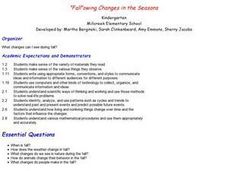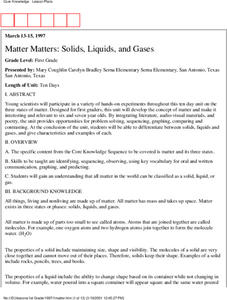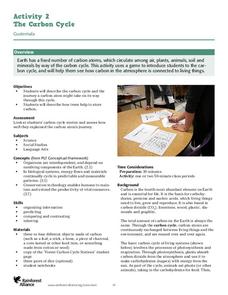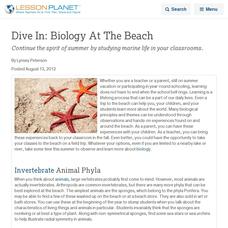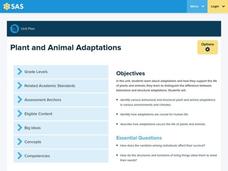Curated OER
"Fall"owing Changes in the Season
Students create a whole class A-B-"C"eason Book. Each student is responsible for creating a "letter" page relating to changes, adaptations, or other fall concepts. After hard copies of the class ABC books are created, the teachers using...
Curated OER
Where Have All the Endangered Gone?
Students explore animals that are endangered. They choose an endangered animal that they would like to keep from becoming extinct. Students create a persuasive presentation to persuade someone to understand why they feel keeping their...
Curated OER
What is Biology?
In this biology learning exercise, students review the characteristics of life and the scientific method. This learning exercise has 19 fill in the blank, 6 matching, and 2 short answer questions.
Curated OER
Algae Part One: An Introduction
Students have the opportunity to view two types of algae under 400x magnification with a compound microscope. They make observations and record their observations through drawings and words. In addition, they identify different qualities...
Curated OER
Ecosystems: A Home By Any Other Name
Students can learn more about the parts of ecosystems through exploration and hands on activities.
Curated OER
Ecology
In this ecology worksheet students complete a crossword puzzle that incorporates all of the ecological vocabulary in the word puzzle.
Curated OER
Matter Matters: Solids, Liquids and Gases
Scientists participate in a variety of hands-on experiments in this ten-day unit on the three states of matter. Lessons incorporate literature, a-v materials, and poetry to help students differentiate between solids, liquids and gases.
Curated OER
GPS Ecosystem (Ecotone) Scavenger Hunt
Students describe the characteristics of an ecotone. In this ecotone lesson, students pick out their area and describe the visual appearance, conditions, ecosystem, biodiversity, predators, prey, and trees in their ecotone. They create a...
Curated OER
What is Sand?
Students complete a sand analysis project. In this sand grains lesson, students learn background information on how sand is formed and what sand grains are made of. Students are given bags of sand and use them to complete a worksheet...
Curated OER
Designing a Real Life Ecosystem!
Students research abiotic and biotic factors concerning the concept of an ecosystem. Record and analyze data collected. Write a lab report in proper and scientific format with thinking and analytical skills. Work as a cooperative team.
Rainforest Alliance
The Carbon Cycle
Scholars learn about the carbon cycle, play a carbon cycle game, and then write a story based on their role as a carbon atom during the game. After the writings, pupils analyze the carbon cycle by leading a class discussion on the material.
Virginia Department of Education
Go with the Flow
How does nature's hierarchy relate to our local human environment? Answer this question, along with others, as the class visually depicts the natural hierarchy provided by nature. Pupils discuss each piece of the pyramid and its energy...
Curated OER
Dive In: Biology At The Beach
Continue the spirit of summer by studying marine life in your classrooms.
Curated OER
Minerals of the Earth
Unearth this gem of a resource to use in your geology unit! With colorful images, bullet-point text, and links to related videos, it deals with the characteristics, properties, and identification of minerals. There are also slides...
Virginia Department of Education
The Cycles of Nature
Encourage peer collaboration and assist with the creation of visual aids to identify carbon, water, and nitrogen cycles as your class learns more about nature. They discuss relative information, create a visual aid depicting the chosen...
Biology Junction
Origin of Life
Aristotle explained the idea of spontaneous generation, a concept which lasted almost 2,000 years before scientists proved it wrong. Scholars learn about the history of our understanding of the origins of life. They read examples of...
Curated OER
Vermicomposting
Third graders study vermicomposting. In this vermicomposting lesson, 3rd graders prepare to begin a unit on decomposition by constructing a worm bin. Students collect worms to be used later in experiments.
Curated OER
DID YOU HELP CREATE THIS
Students examine whether their actions are positively or negatively affecting organisms and their habitats. They choose an animal to study then create a multimedia presentation including charts and graphs of data logger information and...
Curated OER
Principles of Ecology
In this ecology worksheet, students will fill in a graphic organizer showing the relationship organisms have with their environments and with each other. This includes biotic and abiotic factors, tropic levels, and ecological pyramids....
Curated OER
Is Soil Alive?
Third graders observe soil samples. They then form hypotheses as to whether or not soil is alive. Students read and discuss information about soil and components of soil. They state wheter or not they believe soil is alive and list...
Curated OER
Introduction to Macroinvertebrates
Third graders investigate the world of macroinvertebrates and identify the environmental stressors that threaten their existence. Outdoors, they role-play as stressors and invertebrates, with the intolerant species doing pushups, spins,...
Curated OER
Plot Studies
Third graders are introduced to how to properly read a plot map. As a class, they take a field trip to an area surrounding the school and work together in groups to examine small sections of the different environments. To end the...
Pennsylvania Department of Education
Plant and Animal Adaptations
Fourth graders identify behavioral and structural adaptations to plant and animal life. In this unit overview, 4th graders discuss the importance of variation and adaptation in a species survival. This is a unit overview and does not...
Curated OER
In Your Own Backyard
Young scholars observe organisms in their habitat and record their observations. They then draw conclusions about the organism's habitat needs and food sources.


